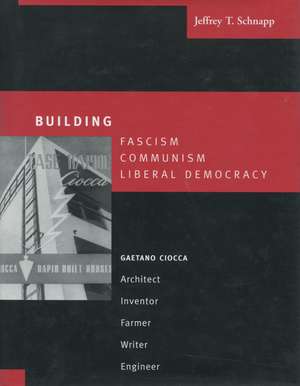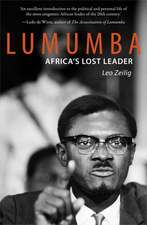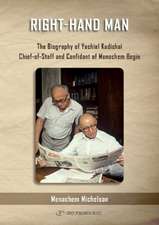Building Fascism, Communism, Liberal Democracy: Gaetano Ciocca—Architect, Inventor, Farmer, Writer, Engineer
Autor Jeffrey Schnappen Limba Engleză Hardback – 4 dec 2003
This book tells the tale of the prolific Italian architect, inventor, farmer, writer, and engineer Gaetano Ciocca, whose career took him from the battlefronts of World War I to Stalin’s Russia, Mussolini’s Italy, FDR’s America, and finally to postwar liberal-democratic Italy. Like celebrated counterparts such as Walter Gropius and Le Corbusier, Ciocca was a visionary so confident in his vision of a future in which all aspects of life would be rationalized and modernized that no set of practical or political obstacles could ever stand in his way. Ciocca’s endeavors included the development of “fast houses,” a “theater for 20,000 spectators,” the “guided roadway,” and the rationalist pig farms referred to by Carlo Belli as “Ciocca’s Grand Hotel for Pigs.”
Preț: 474.85 lei
Preț vechi: 586.24 lei
-19% Nou
Puncte Express: 712
Preț estimativ în valută:
90.86€ • 94.87$ • 75.20£
90.86€ • 94.87$ • 75.20£
Carte tipărită la comandă
Livrare economică 05-19 aprilie
Preluare comenzi: 021 569.72.76
Specificații
ISBN-13: 9780804748773
ISBN-10: 0804748772
Pagini: 312
Dimensiuni: 152 x 203 x 25 mm
Greutate: 0.48 kg
Ediția:1
Editura: Stanford University Press
Colecția Stanford University Press
ISBN-10: 0804748772
Pagini: 312
Dimensiuni: 152 x 203 x 25 mm
Greutate: 0.48 kg
Ediția:1
Editura: Stanford University Press
Colecția Stanford University Press
Recenzii
"This fascinating book uses the little-known Italian engineer Gaetano Ciocca as a prism through which to refract and reflect upon the interactions of culture and politics in Fascist Italy and in early twentieth-century Europe. This work represents what one might argue is the next step in studies of Italian culture in this period." —Barbara Spackman,University of California, Berkeley
Notă biografică
Jeffrey T. Schnapp is the Rosina Pierotti Professor in Italian Literature at Stanford University and Professor in the Department of French and Italian Literature and the Department of Comparative Literature.
Textul de pe ultima copertă
“This fascinating book uses the little-known Italian engineer Gaetano Ciocca as a prism through which to refract and reflect upon the interactions of culture and politics in Fascist Italy and in early twentieth-century Europe. This work represents what one might argue is the next step in studies of Italian culture in this period.” —Barbara Spackman,University of California, Berkeley








